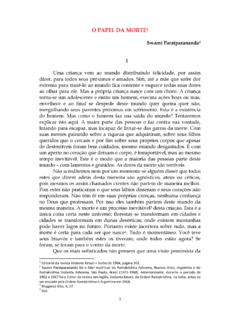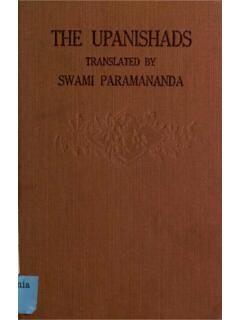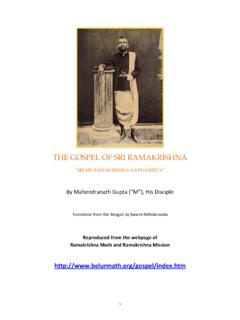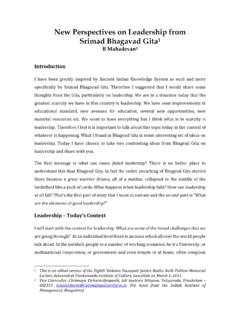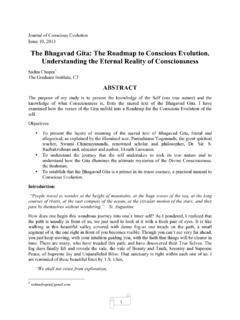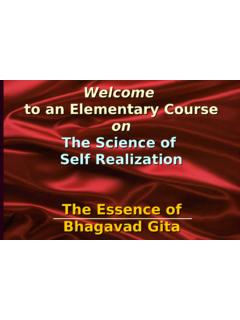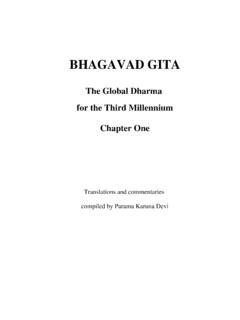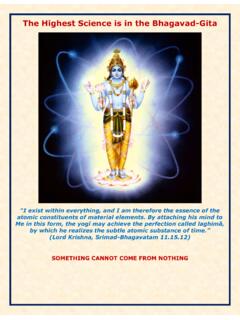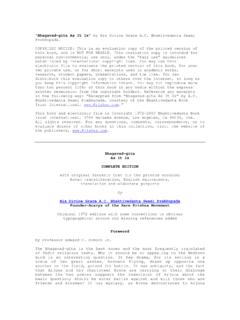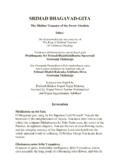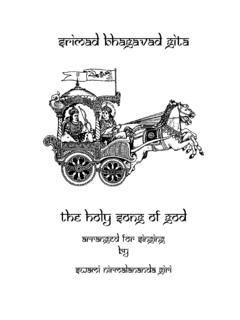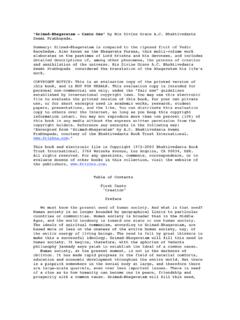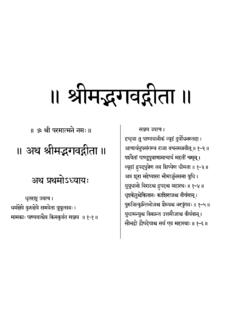Transcription of Bhagavad Gita - Ensinamentos Sagrados da Vedanta
1 1 Bhagavad GITA (The Divine Song) Translated by Swami Tapasyananda1 Introduction This pocket edition of the Bhagavad Gita is specially meant for those who do not know the Devanagari script and would like to have the Text in Roman script with a plain English translation. It will be useful also for those who want to carry a great scripture even to their work spot in order to seek holy company in the midst of work. Though put in the context of a battle scene, the object of the Gita is 1 Swami Tapasyananda (1904-1991) was a vice-president of the Ramakrishna Order 2not war - mongering but exhorting man to do his duty, whatever it be, in a spirit of detachment and dedication.
2 Such an attitude can be sustained only if a man has unreserved faith in God and in His supremacy over the destiny of man individually and of the cosmos as a whole. So beginning with an exhortation to action, the Gita gives in substantiation of that teaching a universal theology without any sectarian or dogmatic stance, which would be found congenial by all who are not in the grip of those narrow loyalties. For this reason we have designated it as the scripture of mankind. Speaking about the universality and profundity of the teachings of the Gita, Warren Hastings, the first Governor-General of India (1773-1784), in his Introduction to the first-ever English translation of the Text by Charles Wilkins (1784) declares that 'Works as the Gita could live long after the British domination in India has ceased to exist' and that it contains passages 'elevated to a track of sublimity into which our habits of judgement will find it difficult to penetrate'.
3 A study of this small Text of seven hundred verses will convince any one that such an encomium of the wisdom contained in it is not a misplaced over-estimate. CONTENTS: PAGES Chapter I. Arjuna's Conversion Page 3 Chapter II. Yoga of Knowledge Page 6 Chapter III. Yoga of Action Page 13 Chapter IV. Renunciation of Action in Knowledge Page 17 Chapter V. Yoga of Renunciation Page 21 Chapter VI. Communion Through Meditation Page 23 Chapter VII. Communion Through Knowledge Page 28 Chapter VIII. Way to Brahman Page 30 Chapter IX.
4 Sovereign Secret Page 33 Chapter X. Divine Glories Page 36 Chapter XI. The Cosmic Form Page 40 Chapter XII. Loving Devotion Page 45 Chapter XIII. The Knower and The Known Page 47 Chapter XIV. The Three Gunas Page 50 Chapter XV. All-Pervading Divine Person Page 53 Chapter XVI. Divine and Demoniac Types Page 55 Chapter XVII. Three Aspects of Faith Page 57 Chapter XVIII. Liberation Through Renunciation Page 60 3 Chapter I Arjuna's Conversion Dhritarashtra said: 1.
5 O Sanjaya! What indeed did my people and the followers of the Pandavas do after having assembled in the holy land of Kurukshetra, eager to join battle? Sanjaya said: 2. Then seeing the army of the Pandavas arrayed in battle order. King Duryodhana for his part approached the teacher Drona and spoke to him the following words: 3. O Teacher! Behold this great army of the sons of Pandu, arrayed in battle order by your talented disciple, the son of Drupada. 4. Here (in that army) are many brave bow-men of note who are equal to Bhima and Arjuna in battle - great car-warriors like Yuyudhana, Virata and Drupada; 5.
6 Dhrishtaketu, Chekitana and the brave king of Kashi; Purujit, Kuntibhoja and Shaibya the best of men; 6. The powerful Yudhamanyu, the brave Uttamauja, the son of Subhadra, and the sons of Draupadi - all these are indeed noted car-warriors. 7. O best of Brahmanas, I shall mention for your information the names of the distinguished leaders of our army. 8. Yourself, Bhishma and Karna, the victorious Kripa, Ashwatthama, Vikarna and Jayadratha the son of Somadatta. 9. These and many more brave men, who are ready to lay down their lives for my sake and who fight with various types of weapons, are present here.
7 All of them are seasoned warriors. 10. Though numerically superior, inadequate is the army of ours defended by Bhishma, while theirs guarded by Bhima is adequate. 11. Therefore do ye all protect Bhishma remaining in appropriate positions in your respective divisions. 4 12. Cheering him up, the valiant grandfather Bhishma, the oldest of the Kurus, sounded a lion-roar loudly and blew his conch-shell horn. 13. Thereupon, conchs, kettle-drums, tabors, trumpets, and cowhorns all blared out suddenly causing a tremendous sound.
8 14. Then Shri Krishna and Arjuna, seated in a great chariot with white horses yoked to it, blew their celestial conch-shell horns. 15. Shri Krishna blew his conch Panchajanya, Arjuna blew Devadatta, and Bhima of terrible deeds sounded his great conch Paundra. 16. Raja Yudhisthira, the son of Kunti, blew his conch Anantavijaya, and Nakula and Sahadeva, Sughosha and Manipushpaka respectively. 17. The great archer, king of Kashi, the mighty car-warrior Shikhandi and Dhrishtadyumna and invincible Satyaki; 18. The King of Drupada, the sons of Draupadi, the mighty armed son of Subhadra - all these, O king, sounded their conchshell horns again and again everywhere.
9 19. That tumultuous uproar, resounding in the sky and over the land, pierced the hearts of the followers of Dhrtarashtra. 20-21. O King! Arjuna, the Pandava-leader with the banner crest of a Hanuman, on seeing the followers of Dhritarashtra arrayed for battle and the clash of weapons about to start, held up his bow and said the following words to Shri Krishna: Arjuna said: 21-22. O Achyuta! Please station my chariot between the two armies so that I may have a view, on the eve of this battle, of all those standing ready to fight, and learn who all are the persons with whom I have to contend.
10 23. Let me see all those who have arrived to favour the evil-minded son of Dhritarshtra in war and are standing ready to join battle. Sanjaya said: 24-25. O King Dhritarashtra! Shri Krishna, to whom Arjuna addressed these words, stationed that most splendid of chariots at a place between the two armies, confronting Bhishma, Drona and all those chiefs, and said: "O Arjuna! See these men of the Kuru horde 5assembled for battle." 26-27. There he saw standing in both the armies - fathers, grand-fathers, uncles, brothers, sons, grandsons, comrades, fathers-in-law and bosom friends.
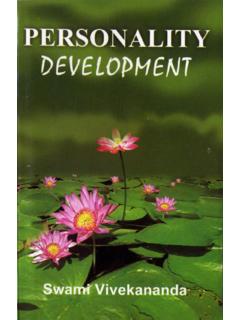
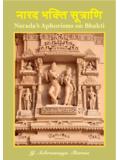
![Taittiriya Upanishad [Sanskrit-English]](/cache/preview/6/2/9/f/4/c/7/b/thumb-629f4c7b56764b8959c1313a86ab6236.jpg)


